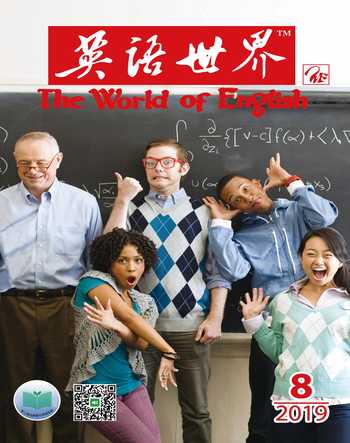翻译擂台(第35期)
2019-09-10林巍
林巍
【原文】
士人獨立之精神
[1]士之读书治学,盖将以脱心志于俗谛之桎梏,真理因得以发扬。[2]思想而不自由,毋宁死耳。[3]斯古今仁圣同殉之精义,夫岂庸鄙之敢望。[4]先生以一死见其独立自由之意志,非所论于一人之恩怨,一姓之兴亡。…… [5]来世不可知也,先生之著述,或有时而不彰。先生之学说,或有时而可商。[6]惟此独立之精神,自由之思想,历千万祀,与天壤而同久,共三光而永光。
——陈寅恪
【点评】
陈寅恪先生是中国现代史上罕见的大学者,不仅因为他博学,而且因为其精神。所选文字是为王国维先生在颐和园投湖自尽两年后所写的一段碑文。他说:“我的思想、我的主张完全见于我所写的王国维纪念碑中。……我当时是清华研究院导师,认为王国维是近世学术界最主要的人物,故撰文来昭示天下后世研究学问的人,特别是研究史学的人。”可见其所具有的标志性意义,同时也是五四精神的重要体现。
就标题而言,对于“士人”,参赛者多译成scholars、intellectuals等,也有极个别用了literatus(复数为literati),三个词尽管都不错,但比较起来,最后一词更加古雅,多用于过去的文人,如:①司马迁是中国历史上著名的文人和史学家。(Sima Qian was a famous literatus and historian in China’s history.)②王维正是这样一位带有文人气质的山水画家。(Wang Wei was such a landscape artist with literati temperament.)③前代文人作品一般以典故的形式被宋词所吸纳。(The former literati writings were the vital source of allusions in Song Ci.)鉴于此文写于1929年,又特指王国维先生,故不妨译为Independent Spirit of a Literatus。有的投稿漏掉了题目的翻译,实属不该。
[1]中,对于“俗谛”,陈寅恪解释:“在当时即指三民主义而言。必须脱掉‘俗谛之桎梏’,真理才能发挥,受‘俗谛之桎梏’,没有自由思想,没有独立精神,即不能发扬真理,即不能研究学术。学说有无错误,这是可以商量的,我对于王国维即是如此。”不过,对于后人来讲,这里可广义理解为摆脱世俗的桎梏。典型的参赛译文,如“The ambition for scholars to do studies and scholarship is simply to be free from the shackles of the ordinary principles, so that the truth can be revealed.”“While reading books and pursuing their studies, intellectuals should free their heart and mind from the shackles of secular truth and the real truth would thereby be carried forward.”等,对于“桎梏”大都用了shackle。该词固然有a restraint that confines or restricts freedom之意,但更主要的是something used to tie down or restrain a prisoner,故此处不一定这样套用,而不妨译为:Literati engaging in learning and research set their minds to free themselves from vulgarity and conventions, in that way truth can be further revealed.
[2]中,“思想而不自由,毋宁死耳”,参赛译文有“This Man chose to die rather than live on with his mind imprisoned.”“If thought enjoys no freedom, he may as well choose to die.”“he would rather die when bereft of the freedom of the mind”,但接续前文看,显然主语过窄了;同样,“I would rather die if our ideas can’t exchange freely.”“Without freedom of thought, I would rather die.”“Think without freedom, I’d rather die.”似乎把主语弄错了;而“Failing to enjoy it’s freedom, they would prefer dead to living at all time.”“Imprisonment of thoughts would do no more good than physical death.”“Thought without freedom is better than to death, which is the common ideal pursued by sages of all ages and times.”等,又有些过度发挥了。就具体语境而言,此句不妨译为:They’d rather die than be stripped of free-thought.
[3]中,对于“斯古今仁圣同殉之精义”,一般译得比较实,如“Saints from ancient to modern times, who fight to death for the cause of benevolence”“what saints and martyrs in all ages sacrifice their lives for”等。而“庸鄙”的“庸”是平庸之意,如“庸俗”“庸言”“庸医”等;“鄙”,粗俗之意,如“鄙俗”“鄙夫”。“庸鄙”源自南北朝《南齐书·王思远传》:“臣实庸鄙,无足奖进。”明代王守仁《传习录》卷中:“今人往往以歌诗习礼为不切时务,此皆末俗庸鄙之见。”而鲁迅《书信集· 致章廷谦》亦有:“据我所见,则昔之称为战士者,今已蓄意险仄,或则气息奄奄;甚至举止言语,皆非常庸鄙可笑。”故译文大可不必用despised/hated /reviled person or people等词,而用mediocrity、common/ordinary people即可。此句不妨译为:At all times we witness men of lofty ideals sacrificing for noble causes, which ordinary people can never nearly match.
[4]中,“先生以一死见其独立自由之意志”一般不难理解,很多译文的意思也大体不错,如“Mr. Wang demonstrated his spirit of independence in the way of death.”“Mr. Wang died to gain his independence and freedom of will.”“With his death, the respectable Wang demonstrates himself as a courageous scholar advertising independence and freedom.”,但在用词和表述上还可再作推敲。对于“一姓之兴亡”,有译for a family fame or fortune、the fate of a family等。此处涉及王国维的个人经历——他曾任末代皇帝溥仪的私人教师,对清王朝情有独钟,因而关于他的死因有“为清殉身”之说,故此处指“清朝”(the Qing Dynasty)。而以他的死来“体现”(其独立自由之意志),除了用demonstrate、manifest、reveal、advertise等,更確切的为materialize/materialization,即有“物化”“具体化”之意,如:①You are meant to realize that it is a materialization of your thoughts and feelings and images, that the inner self forms that world.(人们应认识到,是思想、感受和意象的具体化即内心感受形成了个人的世界。)故此,该句不妨译为:The master’s decent death was not personal, nor dynastic as it has been widely speculated by the public, but a materialization of his independent will.
[5]中,对于“来世不可知也”,译成“The events of the future are difficult to predict.”“No one knows the future for sure.”“We do not know much about the future.”“We have no idea of what our future will look like.”等,这样理解不免过于简单化了;所谓“不可知”是指后人对其价值可能并不完全理解。至于“著述……不彰,……学说……可商”,是一种“互文”,即指其著述和学说尽管都会引起争议,但这并不是先生的真正价值所在。综合而言,不妨译为:Later generations may not entirely grasp his values—his writings may have been doubted, his theories challenged.
[6]是一句感情饱满、掷地有声、永传后世的箴言。固然可以按部就班地译成“But, it is only his independence of spirit, freedom of mind, that will endure everlastingly, shining eternally with the sun, moon and stars.”“But for the spirit of independence and the free thoughts will live long with the heaven and nature and shine forever with the sun, the moon and the stars, even passing thousand years.”“Thus, only his independent spirit and free will are immortal that can really be forever with the earth and the sun and the moon together.”等,但更可突破藩篱,作些大胆补充与调整,如:However, none of his independence of spirit or freedom of thought should be undervalued, since they will truly shine with the sun, moon and stars, lasting forever. 其中,“none of… undervalued”是一种增译,即是将原文要表达的深意挖掘或强调出来,这并不是曲解原文,而是翻译中必不可少的。类似的如(下画线为增词部分):①Reading makes a full man, conference a ready man, and writing an exact man.(读书使人充实,讨论使人机敏,写作使人严谨。)【培根名句】②Perhaps the plot is simply too static and vast to capture on screen.(也许是由于这部作品情节中的画面过于静止和广阔,因而较难实现理想的荧屏呈现。)③There is more entertainment in a good book than in a month of a serial TV program.(从阅读一本好书中所得到的乐趣,比从看一个月的电视连续剧中所得到的乐趣还要多。)④三个臭皮匠,赛过诸葛亮。(Three cobblers with their wits combined equal Zhuge Liang, the mastermind.)⑤班门弄斧(Show off one’s proficiency with the ax before Lu Ban the master carpenter.)可见,“增词而不增意”,恰恰是对原文的更加忠实。同时,该句式也是一种“反译”,起强调作用。类似的如“不允许违反这个原则”可译为:A violation of this principle is not allowed. 亦可为:No violation of this principle is allowed.
关于“陈寅恪”名字的音译,有的译成Chen Yinke,有的为Chen Yinque,对此一直有不同意见。陈先生的学生王永兴教授曾解释,陈寅恪先祖原居福建上杭,属客家系统。其六世祖始由闽入赣,落户义宁。客家人习惯“恪”读què。义宁陈氏一直保持客家传统,故陈氏昆仲名中的“恪”字均读què。少数词典曾收入这个读音,如商务印书馆于民国四年(1915)出版的《辞源》,其“恪”字条下的注音是“可赫切(即kè),亦读如却(即què)”。1937年商务版《国语辞典》也收有“恪”的两个读音。1979年上海辞书版《辞海》注音为:恪(kè课,旧读què却)。1985年12月,在由国家语委、国家教委、广电部联合发表的《普通话异读词审音表》中,则明确规定:“恪”统读为kè。当然这是国家认定的标准读法,但并不妨碍我们在口语上读到陈寅恪先生的名字时仍按习惯读què。所以,二者都是可以接受的。
其实,真正做好翻译,绝不仅是语言的功夫,即要对具体背景、语境和相关的翻译技巧有尽可能多的理解和掌握;同时,也不应缺乏译者的个性。□
【优胜者】
飞吧(北京) 胡雨洋(上海) 张建英(云南) 祝惠娇(广东)
